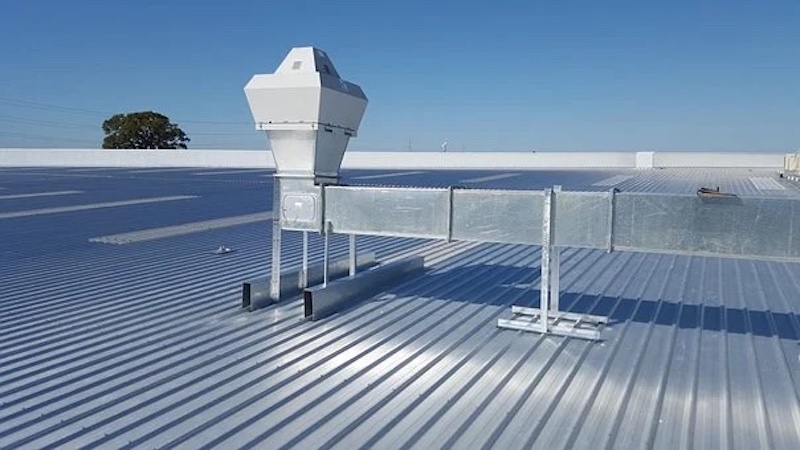
4 Simple Steps to Becoming an HVAC Contractor
When your HVAC system breaks down, you’ll need an HVAC technician, they’re the first people to call, to check or repair your HVAC system if there is a need to.
HVAC technicians or contractors are trained to repair, install, and even more, replace HVAC systems. If you’re wondering what HVAC means, well, it’s an acronym for heating, ventilation, and air conditioning.
Although some repair persons or contractors like to use the acronym HVAC/R because repairing refrigerators can also be an important part of the job.
HVAC contractors may work on construction sites, as a fraction of a general contractor’s team, or they can work as independent contractors.
What Does an HVAC Contractor Do?

Before explaining the steps required to become an HVAC contractor, it’s a good thing to understand what HVAC contractors do daily.
HVAC technicians or contractors go through HVAC training programs to perform several responsibilities related to repairing and installing HVAC systems and equipment.
Some of the certain obligations of an HVAC technician include but are not limited to: reading blueprints, ensuring that all elements of the HVAC system – motors, fans, pumps, switches, compressors, thermostats, etc, are working appropriately, using various tools like metal cutters, flow sensors, current meters, etc, to repair HVAC systems, testing electrical circuits, connecting wires, checking pipes for leak and welding pipes.
There are a lot of duties attributed to an HVAC contractor career. So, if you enjoy overhauling things and functioning with your hands, you’ll find being an HVAC technician rewarding.
How To Become An HVAC Contractor
Step 1 – Begin With A High School Diploma
In a lot of states in the USA, a GED or high school diploma is expected before you can begin pursuing a career as an HVAC contractor.
So, If you’re still in high school, you should focus on taking classes that focus on the subject matter relevant to being an HVAC technician. These courses include – computer science, mathematics, physics, and shop classes (metal shop, woodshop, etc.). More so, If your high school teaches vocational training, take advantage of it.
Going forward, It would be beneficial to take courses like – technical math, blueprint reading, and mechanical drawing. These courses mentioned above will teach you the skills you need to use for your daily work on HVAC systems.
Step 2 – Get An HVAC Certificate
Immediately you’ve obtained your GED or high school diploma, you’ll need to also take extra classes to earn an HVAC certificate.
Indisputably, federal law doesn’t require somebody to have a certificate before they can work on HVAC systems. But, a lot of states including California do have constitutions that require you to have the training and education needed for being an HVAC technician.
So considering this, most people feel it’s best to go forward and pursue a certificate, irrespective of the requirements in their state.
It takes less than one year, in clear terms approximately 9 months, to obtain an HVAC certificate program. while partaking in the program, you will learn a diverse set of technical skills, including diagnostic training,
Principles of mechanics, electricity, and electronics, how to use testing equipment and tools. All of these courses will teach you everything you need to know on how to become a successful contractor.
Step 3 – Complete An Apprenticeship
After you’ve finished off your HVAC certificate program, you should consider an apprenticeship. By completing an apprenticeship, you’ll gain on-the-job experience and training, so you can easily learn from other technicians.
Although an apprenticeship isn’t required, it might be helpful to you in terms of gaining extra experience. Employers are more likely to hire people who have completed apprenticeships.
Apprenticeships last between three to five years. They involve a variety of practical training and coursework. But some apprenticeships are unpaid, but a whole lot of them come with a stipend.
Step 4 – Focus On Getting Certifications
There are lots of certifications you can obtain, such as NATE Certification. NATE is a large nonprofit certification organization for air conditioning technicians.
NATE tests represent real-life working knowledge of HVAC systems and validate the professional proficiency of service and installation technicians.
Manufacturers, HVAC distributors, and contractors across the industry collaborate with NATE to develop informed and competent HVAC technicians.
Passing the NATE Ready to Work Certification implies that you as an HVAC technician student have illustrated the basic and important job skill and knowledge for an entry-level technician, in the regions of component tools, identification, measurements, general safety, basic heat transfer, and electrical safety.
Reading this article, it’s clear that the process of becoming an HVAC technician is straightforward. So what’re you waiting for? Why not become a skilled HVAC contractor today?
Main image by Taylor Vick on Unsplash
